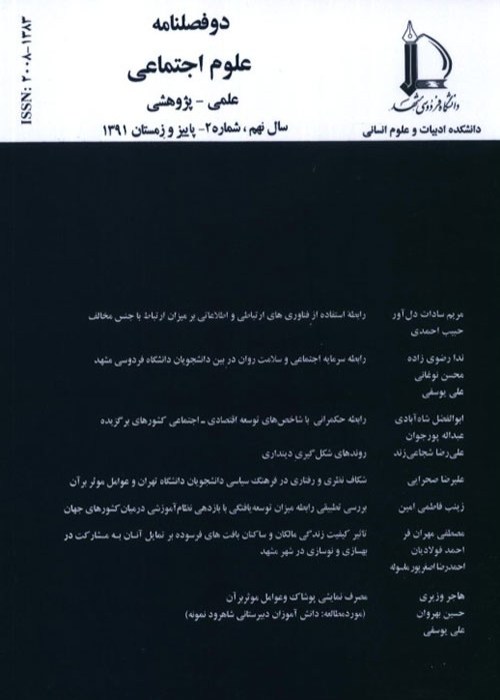The Impact of the Internet, as One of the Tools of Globalization, on Student's Cultural Identity at Tehran University
Author(s):
Abstract:
Introduction
Today, Globalization in many different areas of science is discussed and there are different tendencies towards this phenomenon. The basic assumption of this research is that the impact of Globalization depends on the sociocultural contexts of each society. This study, based on some theoretical arguments, as well as, the results of interviews with students at Tehran University, shows that Globalization does not mean Westernization. In this study, the Internet has been considered as an important tool of Globalization, in particular Cultural Globalization. The basic assumption of this research is that the Internet, according to the social and cultural contexts of individuals, groups and societies, can have different consequences for their Cultural Identity. To test this assumption, the Classical and Modern Literature about Globalization and the Internet have been investigated and then the results of empirical findings of this research are presented.Theoretical Framework: In this study, the views of some experts in Globalization, in particular, Stuart Hall's views about Identity and Culture in the age of Globalization and Anthony Godden's views about the Formation of Identity in Modern Era, has been selected as theoretical framework. The complexity of reading and interpreting media messages and the complexity of the phenomenon of Globalization, according to the various contexts and the social factors, according to Hall's approach, and the formation of Identity in Modern Era, the Interconnectedness of Global Human-Social phenomena, and the role of Human Agency in developing them, in particular, Globalization, according to Godden's approach, are the theoretical basis of this research. In such approaches, the complexity of Globalization, the process of using the Internet and their impact on Cultural Identity of individuals and communities are emphasized.
Research and
Method
This research was conducted through a Case Study method. In Case Study method, the Theoretical or Targeted sampling is used. In this study, the researcher tried to choose students that are an example of professional Internet Users in Academia for interviews. Thereby, 30 students from 14 faculties of Tehran University at different educational levels were randomly selected and interviewed.Conclusion
In all the interviews conducted with students, it was observed that, in different areas of student's life, Family, Religion, Nationality, Ethnic Identity and Culture, National Identity and Culture, National Personalities and Figures, have a very important position. In their view, belonging to an Ethnicity and Nationality does not contradict Globalization. They are fiercely opposed to the rejection of their own Culture and Cultural Alienation. Also, they believe that keeping alive the name and memory of National Personalities and Figures, because of its functions for society, is essential. Most of them believe that not only the Internet disrupts their Social Relations, but also they could have used significantly the various data of Internet in Scientific, Social and Cultural subjects. And finally, they consider Cross-Cultural Exchange and Global Communications necessary for the dynamism, progress and development of society.Suggestions: Generally, my strategies to Conscious Confrontation with the Phenomenon of Globalization include: 1. Criticism of Nostalgic attitudes towards the Past; 2. Criticism of negative attitudes towards Globalization and, instead, take advantage of its positive aspects; 3. Conscious and Non-Ideological confrontation with the phenomenon of Globalization; 4. Providing the requirements for Cultural Pluralism; 5. Rebuilding and strengthening internal Intellectual and Cultural Foundations; 6. Access to Communication and Cultural Authority, through the use of Global Cultural Goods. In general, the fact that Social Problems can be rooted in several factors and a variety of fields, hence, all of these factors and the areas should be identified by Social and Cultural Agents, and by removing existing constraints and problems, provide the necessary conditions for rational choice of Transboundary Intellectual and Cultural Elements. If we provide the necessary conditions for people's thinking and living and believe in their ability to choose the right way of thinking and living, and in addition to gaining their trust and establishing Unity and Social Cohesion, we can play an important role in building and strengthening their Self-Confidence, Self-Control and Intellectual and Cultural Maturity in the complex, changing, uncertain and uncontrollable life in today's Globalized World and Society, and in this way, help the progress and development of society in all aspects, especially in Intellectual and Cultural aspects.
Keywords:
Language:
Persian
Published:
Journal of Social Sciences, Volume:13 Issue: 1, 2016
Pages:
73 to 108
magiran.com/p1613199
دانلود و مطالعه متن این مقاله با یکی از روشهای زیر امکان پذیر است:
اشتراک شخصی
با عضویت و پرداخت آنلاین حق اشتراک یکساله به مبلغ 1,390,000ريال میتوانید 70 عنوان مطلب دانلود کنید!
اشتراک سازمانی
به کتابخانه دانشگاه یا محل کار خود پیشنهاد کنید تا اشتراک سازمانی این پایگاه را برای دسترسی نامحدود همه کاربران به متن مطالب تهیه نمایند!
توجه!
- حق عضویت دریافتی صرف حمایت از نشریات عضو و نگهداری، تکمیل و توسعه مگیران میشود.
- پرداخت حق اشتراک و دانلود مقالات اجازه بازنشر آن در سایر رسانههای چاپی و دیجیتال را به کاربر نمیدهد.
In order to view content subscription is required
Personal subscription
Subscribe magiran.com for 70 € euros via PayPal and download 70 articles during a year.
Organization subscription
Please contact us to subscribe your university or library for unlimited access!


